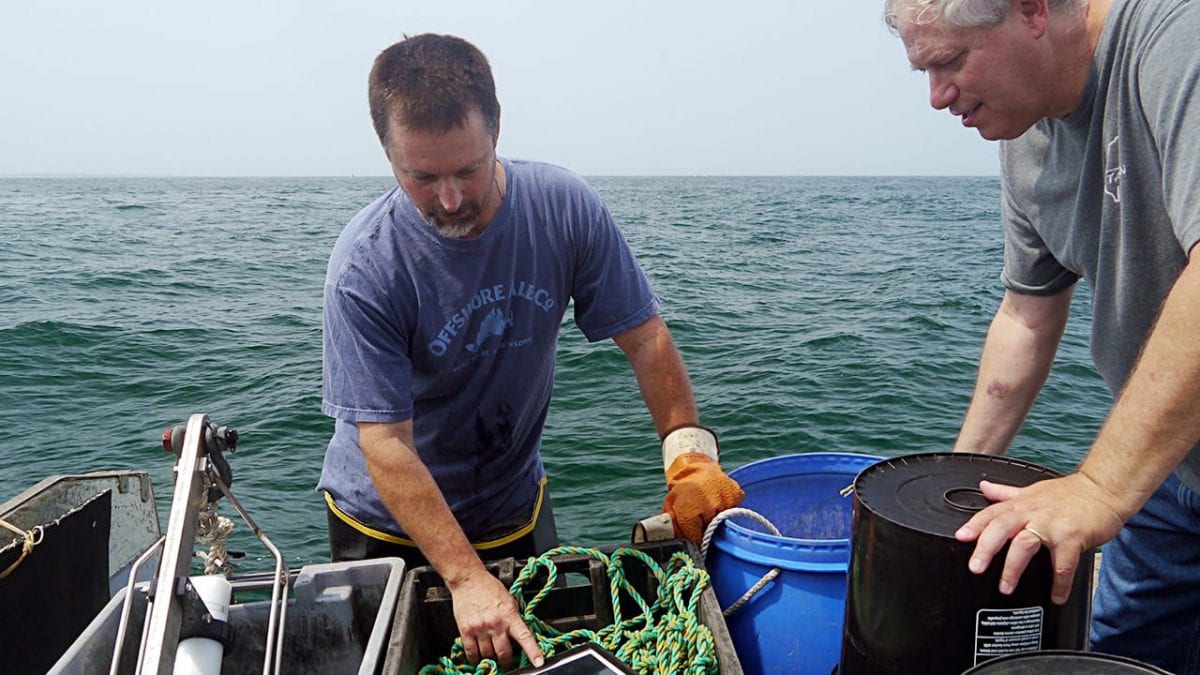News tip: Study of Fishermen, Scientists Partnerships Published
 WHOI physical oceanographer Glen Gawarkiewicz (right) works with inshore scallop fisherman Mike Marchetti, aboard the F/V Mister G, off Point Judith, RI.(Photo courtesy of Commercial Fisheries Research Foundation)
WHOI physical oceanographer Glen Gawarkiewicz (right) works with inshore scallop fisherman Mike Marchetti, aboard the F/V Mister G, off Point Judith, RI.(Photo courtesy of Commercial Fisheries Research Foundation) April 25, 2019
A review paper recently published in the journal Annual Review of Marine Science highlights the value of collaboration between researchers and fishing fleets in monitoring ocean conditions in New England and beyond.
“There is a dire need for more data from the world’s ocean environments and ecosystems, and collaborative research is key to addressing this ever-growing demand,” said Glen Gawarkiewicz, a physical oceanographer at Woods Hole Oceanographic Institution (WHOI) and coauthor of the paper.
The paper analyzes the mutual benefits of this type of citizen science, which engages the commercial fishing industry in the development, implementation, and application of fisheries science.
“Fishers are extremely motivated to collect data, and in many instances are more knowledgeable than academics about ocean conditions in specific regions and how oceanographic conditions are changing over time,” Gawarkiewicz added.
The paper also discusses the components needed to make such collaborative efforts successful.
Featured case studies of collaborative efforts going on around the world are:
- Engaging Fishers to Address Data Deficiencies for Lobster and Jonah Crab in the Northeast United States
- Using a Fishing Fleet to Understand Continental-Shelf-Scale Oceanographic Dynamics During a Time of Rapid Change: The Shelf Research Fleet in the Northeast United States
- Collaborative Research That Enables Adaptive Fisheries Management in the Falkland Islands
- The Coastal Community Ocean Observing Program in Alaska
Key results from these studies include identifying important ocean processes such as Warm Core Ring intrusions onto the continental shelf south of New England and fluctuations in squid populations off the Falkland Islands.
“The case stories illustrate in a compelling way how their successes could be replicated on a large scale through partnerships like the Shelf Research Fleet in Rhode Island,” said Anna Malek Mercer, coauthor and former director of the Commercial Fisheries Research Foundation (CFRF) that helps partner and train members of the research fleet. The fleet has collected more than 420 water column profiles since its launch in 2014. “We predict these types of collaborations will continue to grow in importance as climate change increasingly impacts ocean ecosystems, commercial fisheries, and the global food supply.”
This work was supported by the MacArthur Foundation, the van Beuren Charitable Foundation, the Woods Hole Oceanographic Institution, and the Link Foundation.
